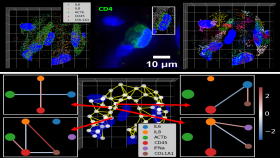The Wallace H. Coulter Foundation awarded $850,000 in total seed money to support five new biomedical research projects from Emory University and Georgia Tech with the goal of accelerating the translation of these technological innovations. Translational funding is used to bridge a gap in development between early stage university research and its commercialization.
The Coulter Foundation Translational Fund of the Wallace H. Coulter Department of Biomedical Engineering, provides annual awards to Emory and Georgia Tech research teams working on products with commercial potential that meet a significant unmet or underserved clinical need.
The projects are selected by an award committee composed of Emory doctors, Georgia Tech engineers, industry experts, venture capitalists, entrepreneurs, angel investors and technology transfer experts from each school.
“The award of funds is just the beginning of the program for these teams,” said Shawna Khouri, managing director of the Coulter Translational Fund. “Over the next year, our teams will work together to push these technologies from academia and into start-ups and industry. This marriage of PI (principal investigator) clinical and technical acumen with the industry and start-up experience from my team makes the distinct difference in translational success.”
Of the 60 projects evaluated during the funding cycle, five emerged as this year’s winners:
Antiviral Peptide: a therapeutic peptide, originally harvested from frog secretions, has shown broad-spectrum antiviral activity, including evidence of efficacy against Zika, Dengue serotypes 1-4, and Influenza H1N1, H3N2, H1N2 and H3N1 viruses. Principal Investigator: Joshy Jacobs (Emory).
Biological Pacemaker: a heart pacing treatment for pediatric patients; this RNA and small molecule combination therapy converts cardiomyocytes into pacemaking cells, eliminating the need for an implantable heart-pacing device. Principal investigators: Hee Cheol Cho (Coulter Department at Emory and Georgia Tech/Petit Institute researcher), Jonathan Langberg (Emory), Phil Santangelo (Coulter Department at Emory and Georgia Tech/Petit Institute researcher).
Inhaled GeneRegs: an antisense technology consisting of a topical gold nanoparticle coated with specific deoxyribozymes (DNAzymes), which regulate and silence pro-inflammatory cytokines that cause severe asthma exacerbations. Principal investigators: Cherry Wongtrakool (Emory) and Khalid Salaita (Emory).
Nephrogenic Diabetes Insipidus: a new therapeutic that restores water balance in pediatric patients with nephrogenic diabetes insipidus (NDI), an x-linked genetic disorder that can lead to mental retardation as a result of dehydration. Principal investigators: Janet Klein (Emory) and Jeff Sands (Emory).
Periurethral Targeting Device: a device that will allow direct, controlled placement of bulking agents into the female urethra thereby increasing the efficacy of stress urinary incontinence treatment. Principal Investigators: Niall Galloway (Emory).
The translational research program has fiscal roots in the $25 million grant the Wallace H. Coulter Foundation made to the Georgia Tech-Emory biomedical engineering program in 2001. This gift resulted in the naming of the Wallace H. Coulter Department of Biomedical Engineering, while also targeting $10 million toward the ongoing support of translational research.
“The Coulter Translational Program is a jewel in our crown, providing an individualized training program with an enviable track record in guiding innovative research teams to conquer translation challenges to successfully commercialization”, said Susan Margulies, chair of the Coulter Department, and a Georgia Research Alliance Eminent Scholar in Injury Biomechanics.
Including the Georgia Tech-Emory department, there are 15 universities with similar translational research partnership programs supported by the Coulter Foundation, including Columbia, Duke, Johns Hopkins, and Stanford universities.
Media Contacts:
Walter Rich
Communications Manager
Wallace H. Coulter Department of Biomedical Engineering
Georgia Institute of Technology
Media Contact
Walter Rich
Keywords
Latest BME News
Commercialization program in Coulter BME announces project teams who will receive support to get their research to market.
Courses in the Wallace H. Coulter Department of Biomedical Engineering are being reformatted to incorporate AI and machine learning so students are prepared for a data-driven biotech sector.
Influenced by her mother's journey in engineering, Sriya Surapaneni hopes to inspire other young women in the field.
Coulter BME Professor Earns Tenure, Eyes Future of Innovation in Health and Medicine
The grant will fund the development of cutting-edge technology that could detect colorectal cancer through a simple breath test
The surgical support device landed Coulter BME its 4th consecutive win for the College of Engineering competition.
New research from Georgia Tech helps doctors predict how therapies will interact with a child's immune system, potentially improving outcomes and reducing risks.








